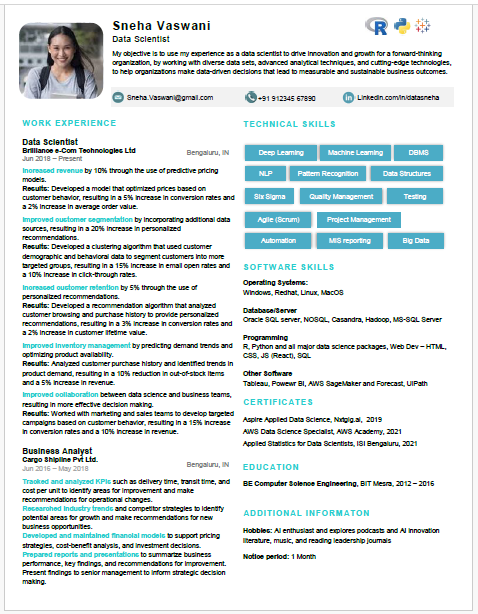Data Scientist
BE Computer Science Engineering

About this template
This is a well-designed resume which can make a significant difference in capturing the attention of hiring managers and landing your dream job.
This resume is made by MS Word, featuring a clean and modern layout designed to highlight your skills and achievements. Tailored to your industry, it ensures you stand out to recruiters and make a lasting impression.
Some important and useful technical skills for Data Scientist
Data scientists require a comprehensive set of technical skills to analyze data, build models, and derive actionable insights. Here are ten important and useful technical skills for data scientists:
1. Programming Languages:
Proficiency in programming languages like Python and R is essential for data manipulation, statistical analysis, and machine learning. These languages offer rich libraries and frameworks for data analysis, visualization, and building predictive models.
2. Statistical Analysis:
A strong understanding of statistical methods is crucial for analyzing data and making inferences. Data scientists use statistics to test hypotheses, identify trends, and assess the reliability and validity of their findings, ensuring data-driven decision-making.
3. Data Wrangling:
Skills in data wrangling involve cleaning, transforming, and organizing raw data into a usable format. Data scientists often deal with messy data, so proficiency in tools and techniques for handling missing values, outliers, and inconsistencies is vital.
4. Machine Learning:
Knowledge of machine learning algorithms and techniques, such as regression, classification, clustering, and neural networks, is key for building predictive models. Data scientists use these algorithms to uncover patterns and make predictions based on data.
5. Data Visualization:
The ability to visualize data effectively is important for communicating insights. Data scientists use tools like Tableau, Matplotlib, and Seaborn to create charts, graphs, and dashboards that present complex data in an accessible and visually appealing way.
6. Big Data Technologies:
Familiarity with big data technologies like Hadoop, Spark, and Hive is essential for working with large datasets. These tools enable data scientists to process and analyze massive amounts of data efficiently, facilitating scalable data solutions.
7. SQL and NoSQL Databases:
Proficiency in SQL is crucial for querying and managing structured data in relational databases. Additionally, knowledge of NoSQL databases like MongoDB or Cassandra is important for handling unstructured data and building flexible data models.
8. Natural Language Processing (NLP):
NLP skills are vital for working with text data, such as extracting insights from social media, customer reviews, or other text sources. Data scientists use NLP techniques for sentiment analysis, text classification, and entity recognition.
9. Cloud Computing:
Experience with cloud platforms like AWS, Azure, or Google Cloud is increasingly important for deploying machine learning models and managing data pipelines. Cloud services offer scalable resources and tools for data storage, processing, and analysis.
10. Data Ethics and Privacy:
Understanding data ethics and privacy concerns is crucial for responsible data handling. Data scientists must be aware of legal and ethical considerations, such as data anonymization and compliance with regulations like GDPR, to protect sensitive information.
Conclusion :
These technical skills enable data scientists to handle data effectively, build accurate models, and deliver valuable insights that drive business decisions and innovation.